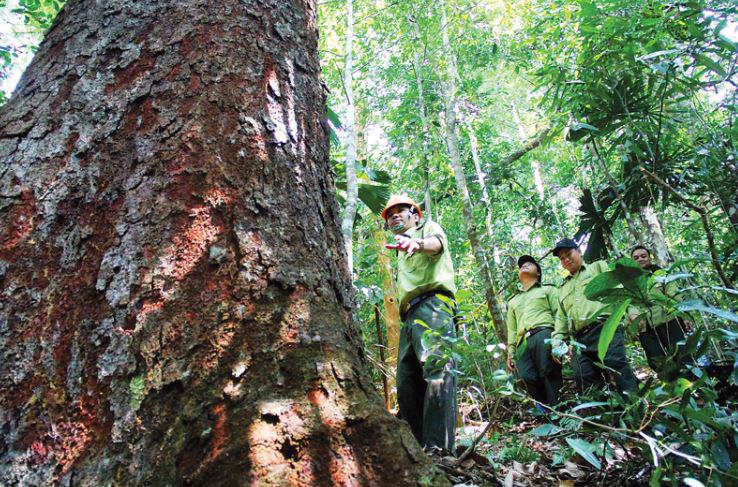Globally speaking, a carbon border adjustment mechanism (CBAM) is aimed at reducing greenhouse gas emissions in high-polluting sectors, as it imposes charges on imports from carbon-intensive manufacturers while encouraging decarbonization efforts to achieve a net-zero future.
The mechanism has been applied in many of Vietnam’s key export markets, including the US and the EU. In order to maintain its export growth, Vietnam must therefore reduce its own carbon-intensive production and services.
Low-carbon economic development towards a circular economy is becoming an inexorable tendency in global efforts for green transition, with the creation and development of carbon markets seen as an increasingly crucial tool. As a deeply globally integrated economy, there is no alternative for Vietnam but to follow such tendencies.
With carbon credit trading new in the country, however, most Vietnamese enterprises remain unaware of its importance.
Mr. Nguyen Vo Truong An, Deputy Director of the Carbon Credit Trading Platform JSC (CCTPA), was quoted by the Vietnam News Agency on October 9, 2023 as recommending the formation of a consulting agency responsible for keeping Vietnamese enterprises fully informed about the registration and verification of carbon credits. With such an agency, enterprises would be “better prepared for a new carbon tariff regime,” Mr. An believes.
According to the World Bank Group’s Country Report on Climate and Development for Vietnam in 2022, the effects of climate change cost the country roughly $10 billion in 2020, or approximately 3.2 per cent of its GDP.
A carbon credit market, if well developed, would contribute to saving a large sum of money. More importantly, it has been identified as a key solution for Vietnam to reach its net-zero emissions goal it committed to at COP26.
The way forward will, however, be long and problematic. Vietnam faces many challenges in building and developing a carbon market, such as the absence of a legal framework, insufficient international cooperation, and limited awareness. To address such issues, the country has issued a number of significant strategic initiatives on sustainable development and green growth, one of which is a development plan for instruments related to carbon pricing, particularly a market for compliant carbon.
In fact, a carbon credit market has been taking shape in Vietnam since 2005, when the country participated in the international carbon market through implementing carbon credit projects, with the first being the UN-run Clean Development Mechanism (CDM).
Vietnam is one of four countries with the highest number of investment projects registered under the CDM, having received 40.2 million carbon credits for 150 projects.
The formation of a carbon market in Vietnam, however, very much remains in the preparatory stage.
The Law on Environmental Protection 2020 stipulates the organization and development of a domestic carbon market, while the government also issued Decree No. 06/2022/ND-CP on the mitigation of greenhouse gas emissions and the protection of the ozone layer, on January 7, 2022. These are important legal instruments for the carbon market to develop and represent a foundation for the future.
Under a project conducted by the Ministry of Natural Resources and Environment (MoNRE), Vietnam will pilot the operation of a carbon credit market in 2025 to connect and exchange carbon credits with regional and international markets, then officially operate a carbon trade exchange in 2028.
There is still much to be done for its carbon credit market to develop smoothly and effectively.
From now until the end of 2027, the government will focus on developing regulations on carbon credit management and the exchange of greenhouse gas emission quotas and carbon credits.
Additionally, manufacturers and service providers must be aware of their responsibility in environmental protection and accept the basic principle of the carbon credit market, where polluters must compensate for their emissions by exchanging and trading carbon credits.
Training on the Emission Trading System (ETS) and carbon market is therefore necessary. Some 145 officials from relevant State agencies, organizations, and enterprises attended such training on February 26 and 27, where leading international experts shared experience in global carbon pricing, the necessary preparations for operating a carbon market, and measurement, reporting, and verification (MRV) requirements within an ETS.
The training resulted from an MoU signed between the Department of Climate Change at MoNRE and the United Nations Office for Project Services (UNOPS), which aims to establish cooperative relations between the two sides within the framework of the Southeast Asia Energy Transition Partnership (ETP) managed by UNOPS.
The above-mentioned legal framework and preparatory work are certain to create the necessary conditions for the formation of a carbon credit market in Vietnam.
With an emerging market economy growing at a rather rapid pace, and the government’s determination and persistent policy regarding a green transition, while enjoying international cooperation, Vietnam is expected to have a carbon credit market of significant potential, though a host of challenges still lie ahead.









 Google translate
Google translate